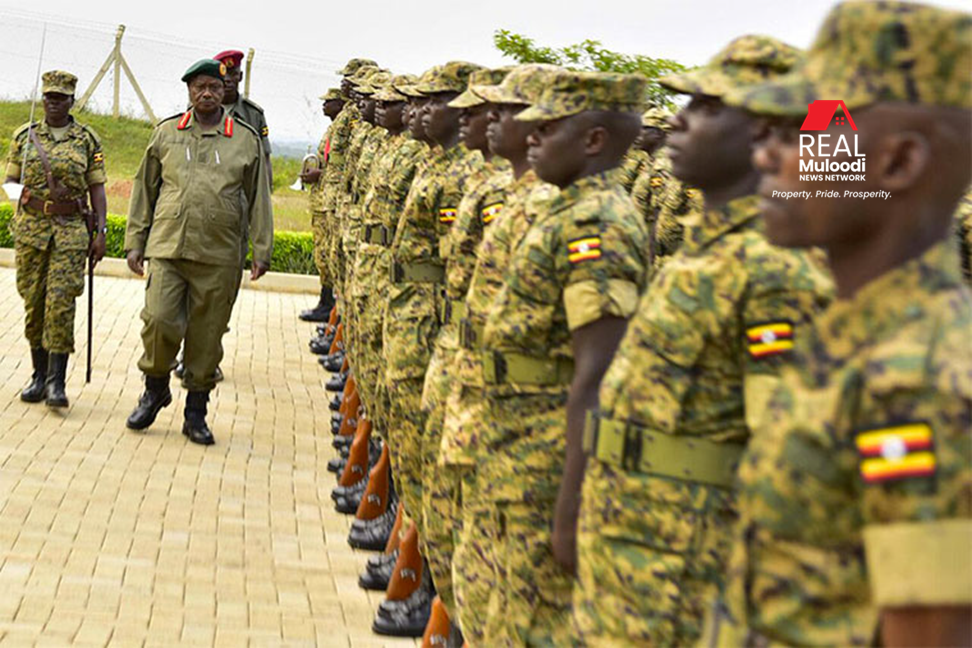UGANDA, Kampala | Real Muloodi News | In a significant and long-awaited decision, President Museveni has announced a ban on army engaging in any land matters in Uganda. This pivotal move, revealed during a press briefing on December 22 2023, stems from a Cabinet resolution, reflecting a collective decision that the army should no longer be involved in land issues.
The President emphasised his commitment to issue an executive order to enforce the ban, asserting that soldiers should focus on their primary mandate of safeguarding the country’s borders rather than patrolling land boundaries.
The decision to ban the army from land matters has been met with widespread approval from land rights advocates, stakeholders, and various organisations.
The move addresses concerns raised by the Bamugemereire Commission, which conducted a comprehensive inquiry into land matters across the country.
The commission recommended keeping soldiers out of land evictions, citing instances of instigation and violence perpetration by uniformed personnel.
Richard Muganzi, the executive director of Landcode Initiative, a non-governmental organisation dedicated to promoting land rights, hailed the decision as a crucial step in demilitarising civilian domains.
He emphasised the need to enhance the capacity of the Uganda Police Force at the sub-county level to effectively handle land-related issues at the village level, highlighting the importance of maintaining law and order while protecting life and property.
Ritah Kemigisa, advocacy and communication associate at Stand for Her Land Campaign Uganda, an organisation focused on protecting women’s rights to land, highlighted the potential positive impact of the ban on women’s land rights.
She noted that reducing military presence in land matters could contribute to a safer environment for women, as such presence is often linked to human rights violations, including gender-based violence.
Cultural institutions, including the Buganda Kingdom, have expressed support for the ban, describing it as long overdue.
Leaders emphasised the importance of empowering the judiciary, police, and local leaders to address issues amicably without involving the armed forces.
Andrew Byakutaaga, the Bunyoro Kitara Kingdom’s prime minister, welcomed the decision as a step in the right direction, emphasising that the army should adhere to its clear mandate.
However, some voices, like Kilak South Member of Parliament Gilbert Olanya, expressed reservations, citing concerns about the enforcement of presidential directives.
Despite acknowledging the merit of stopping the army’s involvement in land matters, Olanya pointed out that previous directives related to issues such as the Balaalos were not consistently respected, and army generals were allegedly violating them.
The involvement of soldiers in land-related activities has been a recurring issue, with instances of soldiers enforcing evictions and patrolling contested lands.
A 2018 survey in Mubende District revealed that powerful individuals, aided by soldiers, had grabbed over 1.9 million hectares of land.
The army, along with the police and judiciary, was implicated in the violent displacement of residents and land-grabbing.
In October, residents in Kayunga District confronted and disarmed Uganda People’s Defence Forces (UPDF) soldiers patrolling a disputed piece of land.
Earlier in March, soldiers deployed to guard a contested land in Kyankwanzi reportedly defied orders from the State minister for Lands, highlighting instances where military involvement contradicted official directives.
Land management in Uganda has long been plagued by challenges such as fraud, forgeries, issuance of multiple titles, and evictions.
President Museveni acknowledged these issues and expressed his government’s commitment to implementing reforms to address them.
He highlighted the strength of the 1998 Land Act in protecting bibanja (small land holdings) and attributed challenges to a lack of awareness about the existing laws and the elite’s failure to assist ordinary people.
As Uganda takes this crucial step to ban the army from land matters, the focus now shifts to effective enforcement, collaborative efforts to strengthen legal structures, and sustained awareness campaigns to educate citizens about their land rights.
The decision marks a turning point in the country’s approach to land governance, emphasising the importance of civilian authorities in resolving land-related issues and safeguarding the rights of individuals and communities.
READ MORE LIKE THIS:
UPDF Soldier Beaten to Death in Apaa Land Dispute Retaliation
UPDF Initiates Eviction of 40,000 Settlers in Apaa Land Dispute
Soldiers Defy Ministerial Directive to Guard Kyankwanzi Land



